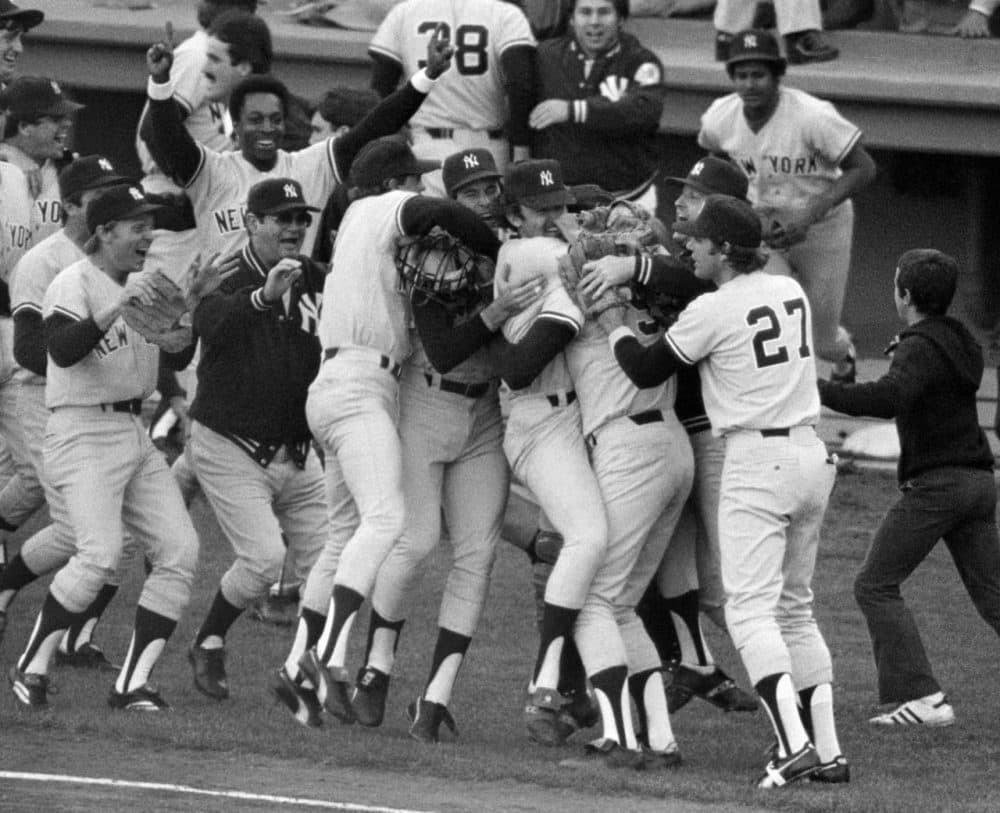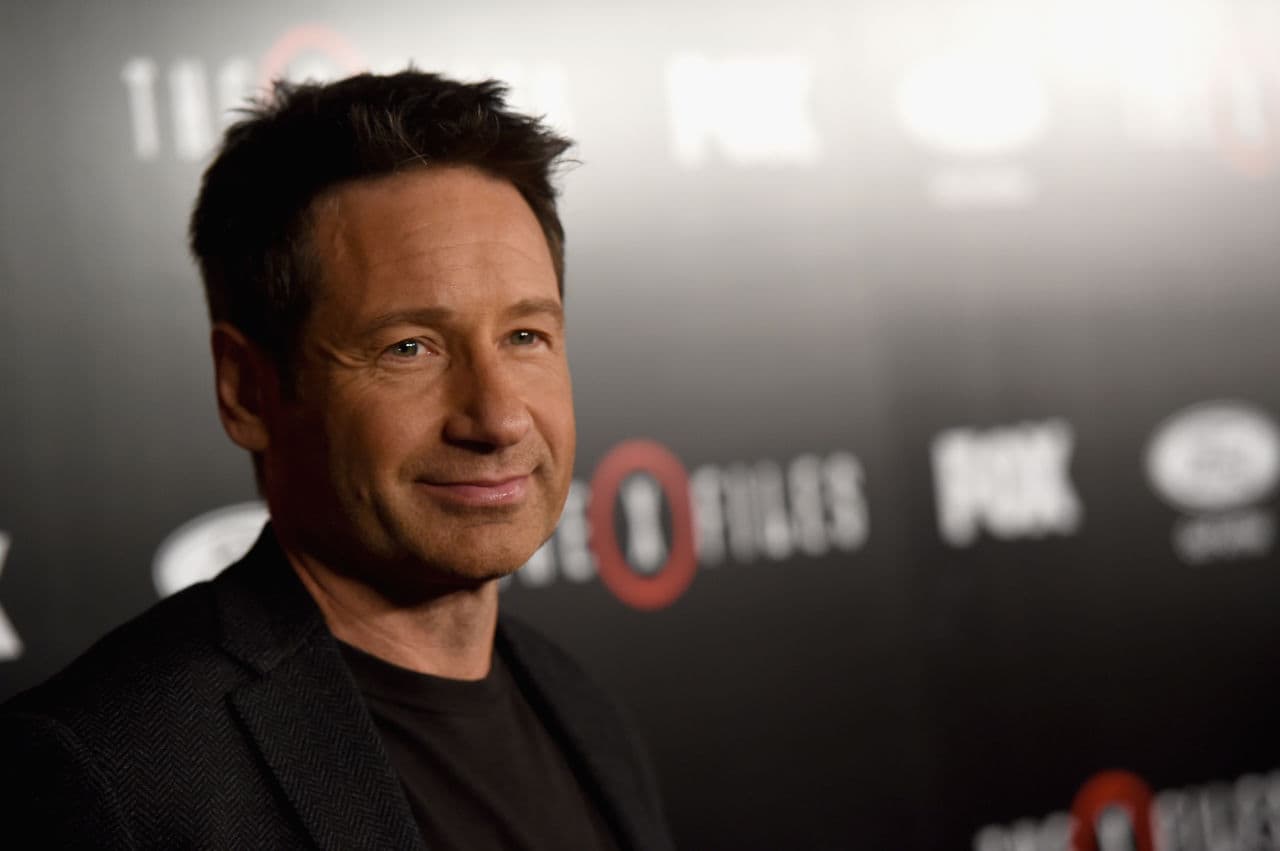Advertisement
David Duchovny On The Magic Of 'Bucky Bleeping Dent'
Resume
"There’s something kinda magical just about the name 'Bucky Dent,'" former X-Files star David Duchovny says. "I don’t know why."
Duchovny is a New York Yankees fan. But Red Sox fans of a certain age are likely to consider the name “Bucky Dent” kind of magical, too, in an evil-magical kind of way.
"It just struck me as funny," he says.
Bucky Dent’s home run coming in time to beat the Red Sox in the 1978 playoff game that sent New York — rather than Boston — to the ALCS? Well, sure. Funny. Magical.
Anyway — and sometime later — Duchovny found that there was more to that home run and the guy who hit it than had been immediately apparent. He discovered that the truth was out there … on a roof. Because it was actually from some guys on a roof of a home in New England that he learned Bucky Dent had acquired a middle name.
DD: It was late summer, and the family was out near the Cape. It’s an old house and constantly needs work being done on it. And then there were a couple guys working on the roof that day, and I heard one of them say "Bucky Bleeping Dent." I would spell that bleep with an "F" and a "u."
BL: When you first heard the phrase, which I think you say sounded like all one word when you first heard it, did you have to ask somebody what it meant?
DD: I did! I said, "Did you say ‘Bucky Bleeping Dent?’ like I think I just heard that?" You know, baseball has cool names, right? There’s just so many. Like Willie Mays is a great name. Mickey Mantle is a great name. Heinie Manush, Enos Slaughter, Cupid Childs, Baby Doll Jacobson. Anyway, for my money, Bucky Bleeping Dent is right up there among the most happy things you can say.
Yeah. In New York, certainly. But for Duchovny, the significance of "Bucky Bleeping Dent" was that the three-part name and all it implied kicked his imagination into gear. He began to think about how much an old, displaced Red Sox fan, living out the last of his days in New York in 1978, might begin to hope his team would, after all, become a champion in his lifetime. And then how heartbreaking it would be for this old fan — Duchovny calls him Marty — and he’s dying of cancer — how heartbreaking it would be for Marty when the lead the Red Sox had built began to disintegrate, and then when "Bucky Bleeping Dent" brought the dream crashing down with one unlikely swing of his otherwise lightly-regarded bat. And then he began writing a novel that explored the lengths to which Marty’s son, Ted, might go to keep the dream — and his father — alive.

DD: On the days when the Sox lose, Marty is dragging and doesn’t seem well. On days when they win, he seems like a healthy man. So it’s then where, Ted, feeling decent about the Sox’ chance that year — because they were doing great up until August — and that’s when Ted concocts this scheme — luckily before the ages of VCRs or 24-hour sports networks --[to] fake his father, whose only way of getting the sports news, aside from watching the amazing Bill Mazer at 11 o’clock (which Ted can easily unplug the TV and shield him from) — he gets these doctored newspapers from the kiosk, from these old guys who are only more than willing to engage in the charade.
BL: I think my favorite single episode, and actually it’s an episode that’s repeated a number of times in the charade, involves the necessity of creating rainouts. Can you talk about that a little bit?
DD: [Laughs] Yeah. So what happens for Marty, who is conveniently quite ill and isn’t going out and check the skies, is that Ted, his son, enlists these old dudes down at the corner to kinda get up on the roof in their bathing suits, because they do love their sun back in 1978, with hoses and things like that and try to create some kind of rainstorm, mostly when Boston is losing. You know, when Boston has lost, Ted will create a rainout. I just think it’s an act of love, you know, and in the universe that I’m trying to create in that book, this philosophical idea that there is no base reality. There’s just this imaginative world that we create, and the morality of that would seem to be what is the greatest good that comes out of that imagination? What is the lie that we can tell that is gonna bring the most good to the most people? And I guess that’s the world of "Bucky Bleeping Dent."
BL: I wonder If there are gonna be some people who read this book, which I enjoyed very much — and I have to acknowledge that I wasn’t sure I would. Because I looked at it and I said, “Oh, yeah…fathers, sons, baseball, fathers and sons playing catch, yadda, yadda, yadda." But I enjoyed it a lot. I thought it was terrific. I wonder if there are going to be some people who say, “My God, David Duchovny’s been successful as an actor, been in all kinds of things. And now he’s successful as a writer. I wonder if there’s anything this guy can’t do?”
DD: I was thinking the end of that sentence was gonna be like “F him.” Because I feel like I have some of that coming at me sometimes. There’s plenty I can’t do. But I will say that my self-identification, if you will, as a writer predates any kind of self-identification as an actor. My father was a writer — published his first novel at the age of 72. My grandfather was a journalist-- worked for the Yiddish daily newspaper in New York called The Forward. My mother was a first grade teacher — taught many generations of kids on the Lower East side of Manhattan how to read. So I would have said I’m a writer. If you ever asked me, “What are you gonna do?” I’m gonna write like my Dad. So I feel like this is more of a return to something that I’ve always been, as opposed to, hey, you know me as an actor, so read this please.
So, you’re not going to read David Duchovny’s book because he’s an actor and he’s said please. He knows that. But maybe the story of Marty and Ted has made you curious enough to check it out. If that’s the case, you’ll want to know the title of the novel, which is, perhaps inevitably, "Bucky Bleeping Dent," where you begin spelling “Bleeping” with an “F.”
This segment aired on April 23, 2016.

